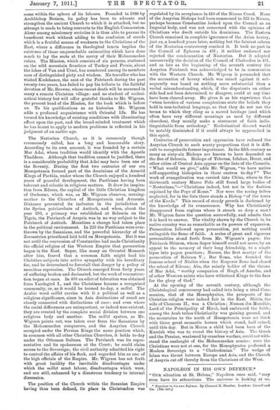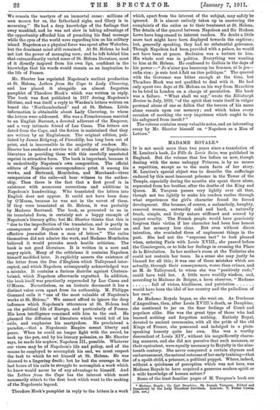London: Cassell and
NAPOLEON IN HIS OWN DEFENCE.* "011n situation at St. Helena," Napoleon once said, "may even have its attractions. The universe is looking at us.
We remain the martyrs of an immortal cause: millions of men mourn for us, the fatherland sighs, and Glory is in mourning." He had a deep knowledge of the feelings that sway mankind, and he was not Blow in taking advantage of the opportunity afforded him of preaching his final message while the eyes of the world were regarding him on his solitary island. Napoleon as a physical force was spent after Waterloo, but the dominant mind still remained. At St. Helena he had not lost the power of managing men; and he left behind him that extraordinarily varied mass of St. Helena literature, most of it directly inspired from his own lips, confident in the knowledge that his words would remain as an inspiration to the life of France.
Mr. Shorter has reprinted Napoleon's earliest production at St. Helena, Letters from the Cape to Lady Clavering, and has placed it alongside an almost forgotten pamphlet of Theodore Hook's which was written in reply. The book was first published in 1817 during Napoleon's lifetime, and was itself a reply to Warden's letters written on board the 'Northumberland' and at St. Helena. Little information is obtainable about Lady Clavering, to whom the letters were addressed. She was a Frenchwoman married to an English Baronet, a devoted adherent of the Emperor, and a very intimate friend of Las Cams. The letters are dated from the Cape, and the fiction is maintained that they are written by an Englishman. The original edition, pub- lished by James Ridgway, of Piccadilly, has long been out of print, and is inaccessible to the majority of readers. Mr. Shorter has rendered a service to all students of Napoleonic literature in providing them_ with this carefully annotated reprint in attractive form. The book is important, because it is undoubtedly Napoleon's own composition. The official editors of Napoleon's correspondence print it among his works, and Bertrand, liontholon, and Marchand—three companions of the exile—all bear witness to the author- ship. Then there is the fact that a first proof is in existence with numerous corrections and additions in Napoleon's handwriting. Who translated the letters into English does not appear. It could not have been done by O'Meara, because he was not in the secret of them. If they were translated at St. Helena, it was probably by Madame Bertrand. The book, as presented to us in its translated form, is certainly not a happy example of Napoleon's literary gifts; but Mr. Shorter thinks that this is "due to the imperfection of the translation, and is partly in consequence of Napoleon's anxiety to be here rather an effective journalist than a man of letters." The exiles themselves did not admire the work, and Madame Montholon believed it would provoke much hostile criticism. The book is not good literature. It is written in a sore and angry spirit. Many of the criticisms it contains Napoleon himself modified later. It explicitly asserts the existence of the letter from the Due d'Enghien which Talleyrand inter- cepted, and which Napoleon subsequently acknowledged was a mistake. It contains a furious diatribe against Chateau- briand, which Napoleon afterwards regretted. In addition, the book itself was practically superseded by Las Casas and O'Meara. Nevertheless, as an historic document it has a distinct value even apart from its authorship. M. Philippe Gonnard calls it "one of the most valuable of Napoleon's works at St. Helena." We i3annot afford to ignore the deep influence which Napoleon's utterances at St. Helena had on the political life of Europe, and particularly of France. His keen intelligence remained with him to the end. He planned the diffusion of literature which would tell of his ' exile, and emphasise his martyrdom. He proclaimed a paradox,—that a Napoleonic Empire meant liberty and peace. When he could no longer fight with the sword, he took up the pen, and by his literary polemics, as Mr. Shorter says, he made his nephew, Napoleon M., possible. Whatever our views may be of Napoleon's life and policy, and of the means he employed to accomplish his end, we must respect the task to which he set himself at St. Helena. He was doomed to a lingering death; but he had the courage in the last hours of his exile to struggle to accomplish a work which he knew would never be of any advantage to himself. And the Letters from the Cape has the interest which must necessarily attach to the first book which went to the making of the Napoleonic legend.
Theodore Hook's pamphlet in reply to the letters is a work which, apart from the interest of the subject, may safely be ignored. It is almost entirely taken up in answering the complaints of the exiles as to their treatment at St. Helena. The details of the quarrel between Napoleon and Sir Hudson Lowe have long ceased to interest readers. No doubt a little more tact might have been displayed towards the captives ; but, generally speaking, they had no substantial grievance. Though Napoleon had been provided with a palace, he would not have been at peace. Seclusion was a torture to him. His whole soul was in politics. Everything was wanting to him at St. Helena. He confessed to Gallois in the days of his power :—" Je n'aime pas beaucoup lea femmes, ni le jeu- enfin rien je suis tout fait an etre politique." The quarrel with the Governor was bitter enough at the time, but Theolore Hook was not qualified to deal with it. He had only spent two days at St. Helena on his way from Mauritius to be tried in London on a charge of peculation. His book was a failure. "What shall we say," wrote the Edinburgh Review in July, 1819, "of the spirit that vents itself in vulgar personal abuse of one so fallen that the terrors of his name alone remain upon our memory ; and which takes every occasion of mocking the very impotence which ought to be his safeguard from insult P " The volume contains many valuable notes, and an interesting essay by Mr. Shorter himself on "Napoleon as a Man of Letters."



















































 Previous page
Previous page